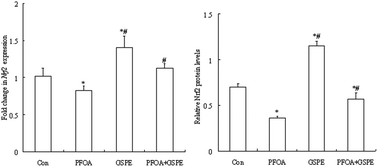Grape seed proanthocyanidin extract protects against perfluorooctanoic acid-induced hepatotoxicity by attenuating inflammatory response, oxidative stress and apoptosis in mice
Abstract
Grape seed proanthocyanidin extract (GSPE) is a rich source of proanthocyanidins with multiple biological activities and potential health benefits. In the present study, we investigated the protective effect of GSPE against liver injury caused by perfluorooctanoic acid (PFOA) in mice and its possible mechanisms of action. Simultaneous treatment with GSPE for 14 consecutive days attenuated the functional and morphological changes in the liver of PFOA-exposed mice. Furthermore, simultaneous supplementation of GSPE reduced the production of inflammatory cytokines IL-6 and TNF-α, increased the expression of Nrf2 and its target antioxidant genes superoxide dismutase and catalase, and decreased the production of malondialdehyde and hydrogen peroxide in the liver of mice exposed to PFOA. Moreover, GSPE supplementation up-regulated the expression of anti-apoptotic protein Bcl-2 and down-regulated the expression of pro-apoptotic proteins p53 and Bax, with a decreased activity of caspase-3 in the liver of PFOA-treated mice. These findings suggest that GSPE ameliorates PFOA-induced inflammatory response, oxidative stress and apoptosis in the liver of mice.


 Please wait while we load your content...
Please wait while we load your content...